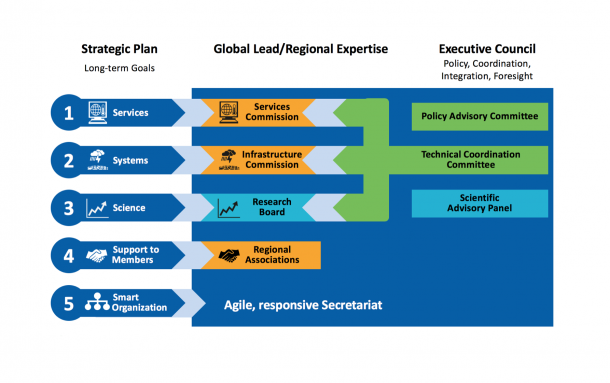Sweeping reforms to the World Meteorological Organization (WMO) have been approved at the World Meteorological Congress, which took place in Geneva, Switzerland, from June 3 to June 14, in an attempt to embrace a more comprehensive Earth system approach. The reforms will reshape the WMO to provide a stronger focus on water resources, the ocean, coordinated climate activities and translating science into services for society. There will also be greater engagement with the private sector and more structured collaboration with development agencies. The governance structure of the WMO will be overhauled to ensure it is better equipped to tackle mounting challenges such as climate change, extreme weather, environmental degradation, and urbanization, while harnessing technological advances from satellites, supercomputing and big data. It seeks to narrow the growing capacity gap between rich and poor and to channel more resources to the WMOs regional operations. The WMO is needed more than ever, said WMO secretary-general Petteri Taalas, who was re-appointed for an additional four-year term at the Congress. WMO supports climate change mitigation by providing scientific facts based on measurements and model calculations for decision makers. It also plays a major role in climate adaptation through multi-hazard early warning services and serves as a platform to transfer know-how from developed meteorological and hydrological services to less developed ones. Congress has endorsed a new concept for WMO and now it is our job to get it up and running, he said. Elsewhere, Prof. Dr Gerhard Adrian, president of the German Weather Service (DWD), was elected as the new WMO president. The Executive Committee, led by Adrian, approved a 2% increase in the WMOs regular budget, to CHF 271,544,400 (US$270m) for the four-year period 2020-2023. The WMO sets the framework for the successful cooperation of its member states to accomplish their tasks for the well-being of societies, said Adrian. Fulfilling this important duty is based on the global meteorological infrastructure coordinated by WMO. My aim is that this infrastructure as well as the indispensable global exchange of data are improved even further and guaranteed into the future. It is our collective responsibility and my main interest to strengthen the WMO. WMO governance reform The strategic plan sets out long-term goals and priorities including: – Enhancing preparedness for, and reducing losses of life and property from, hydrometeorological extremes; – Supporting climate-smart decision making to build resilience and adaptation to climate risk; – Enhancing the socioeconomic value of weather, climate, hydrological and related environmental services. The potential benefits of the WMO reform process include: – An Earth system approach embracing meteorology, climatology, hydrology, oceanography, seismology, volcanology, air quality, and greenhouse gases; – Multi-hazard and impact-based seamless services covering weather, climate, water, aviation, marine, agriculture, urban, energy, and health; – Wide climate perspective which coordinates observations, services, science, mitigation and adaptation; – Closer involvement of hydrological services in WMO activities and weather-water synergies; – Organized and controlled engagement of the private sector in WMO activities; – Optimal use of national meteorological and hydrological services and secretariat resources, thus providing more support for regional activities.
Congress approves WMO governance reforms



